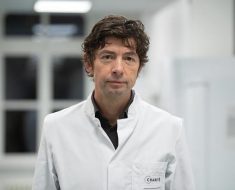The Cancer Informatics for Cancer Centers represents chief information officers and other informatics leaders from 70 National Cancer Institute-designated cancer centers nationwide. At the HIMSS Precision Medicine Summit on May 18, the two co-founders of CI4CC offered their thoughts on how the vast promise of precision oncology can be realized more quickly at NCI and beyond.
Warren Kibbe, chief for translational biomedical informatics and chief data officer at Duke University, and Sorena Nadaf, chief informatics officer and director of data science at City of Hope, founded CI4CC to offer a forum for the sharing of ideas among cancer center informatics and IT leaders, and other stakeholders from across healthcare.
Most recently, they have been intently focused on helping the ideals of genomic research gain traction in healthcare settings of all shapes and sizes Despite the "tremendous hype" around precision medicine, its promise is real and potentially transformative, said Kibbe.
The advent of gene sequencing and improved biological understanding more generally has "changed our view of cancer as a disease in last 20 years," he said, and that "has helped us target and develop new therapies."
And sequencing continues to improve and get less expensive by the day. That means technology and informatics professionals have a hugely important role to play as the huge data generated by those techniques keeps proliferating.
"I worry as an informatician about where we're going to put all that data and make it accessible," said Kibbe.
Despite those concerns, he's even more excited about the huge leaps in evolution made for imaging, nanotechnology and more. Still, there's work to be done to capitalize on those advances, and it involves developing sound techniques for data science and process improvement at healthcare organizations large and small.
"We really need to build a learning health system for precision medicine to be real," said Kibbe.
Making the most of precision medicine's achievements means "building a different environment for how we think about sharing data," he explained.
In part, he pointed to some reluctance from organizations such as his own when it comes to opening the spigot of their own health information: "Academic Medical Centers are too focused on the perceived value of their own data to let it flow," he said.
But community care settings account for 85 percent of cancer treatments, Kibbe pointed out. That means they have 85 percent of the data. "We need to not be afraid to share it so we all learn from it."
From there, healthcare needs to get better at integrating genomic information into EHRs, and commingling it with labs numbers and frictionless patient-generated data.
Easy, right? But the benefits of getting the technology infrastructure and data management squared away will be immense, said CI4CC's Sorena Nadaf.
The advent of precision medicine has already "changed the way we're looking at every patient," he said.
Still as "our understanding of disease has grown," the way healthcare manages and treats its patients has largely remained the same for the past several decades, he said. "That gap is where translational science lives."
We're "closer and closer to closing this gap," said Nadaf. But doing so will demand sound data science ("we're all still making methodological errors when we do deep learning," Kibbe notes) and robust technology infrastructure.
But not only technology, of course. Nadaf noted that "despite all the hype about AI, it's is much more challenging than many believed it would be." (Need evidence? Just look at the abandoned $62 million rollout of IBM's Watson at University of Texas M.D. Anderson Cancer Center.)
But "it's not technology that's going to drive the changes," said Nadaf. "It's the way we apply and learn from it that will allow us to grow.
Twitter: @MikeMiliardHITN
Email the writer: [email protected]
Source: Read Full Article





